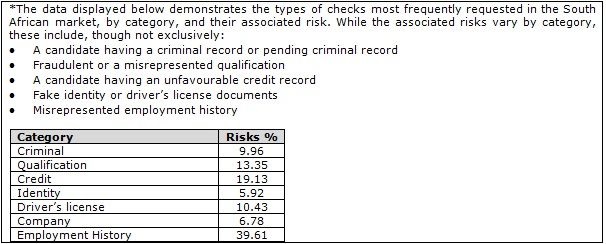
Top stories






More news


Marketing & Media
Ads are coming to AI. Does that really have to be such a bad thing?














According to Michelle Baron-Williamson, CEO of Managed Integrity Evaluation (MIE): “This trend is expected to grow rapidly in the coming years. In fact, the global employment screening services market is forecasted to grow to $5.46 billion by 2025. Furthermore, as pressures mount to combat and eradicate all forms of fraud and corruption, markets are also seeing growing demand for quality, comprehensive and cost-effective background screening and verifications solutions.”
In South Africa, the latest MIE Annual Report, based on the company’s 2018 transactional data, highlights an increase in the number of requested checks conducted year-on-year (y-o-y). “This indicates that despite another year of subdued economic and business growth – with unemployment in South Africa remaining high at 27.1% - there is still movement in the job market and steady demand for and adoption of background screening and verification services and solutions,” adds Baron-Williamson.

The report shows that over the last year there has been an increase in demand for company checks, which highlights growing market awareness on the importance of supplier vetting. Requests for fraud listing and insurance regulation checks have also increased, in line with regulation adoption - especially within the Financial Services sector.
“In terms of candidate screening, findings show that employers are becoming increasingly aware that qualification and criminal checks, alone, are not sufficient to gauge a candidate’s suitability. As a result, there is growing market recognition on the importance of conducting employment history checks and comprehensive vetting of the candidate’s CV, whether for a part- or full-time appointment,” indicates Baron-Williamson.
“More robust risk management is often a key predictor of economic and business success, especially in the complex, competitive and highly regulated operating environments of today. Therefore, mitigating risks associated with an unsuitable appointment – in a candidate or supplier – will continue to gain traction as a top priority as public and private sector entities, alike, become more aware of the value added to their proactive and operational risk management,” concludes Baron-Williamson.